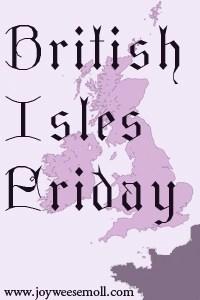 Welcome to British Isles Friday! British Isles Friday is a weekly event for sharing all things British and Irish - reviews, photos, opinions, trip reports, guides, links, resources, personal stories, interviews, and research posts. Join us each Friday to link your British and Irish themed content and to see what others have to share. The link list is at the bottom of this post. Pour a cup of tea or lift a pint and join our link party!
Welcome to British Isles Friday! British Isles Friday is a weekly event for sharing all things British and Irish - reviews, photos, opinions, trip reports, guides, links, resources, personal stories, interviews, and research posts. Join us each Friday to link your British and Irish themed content and to see what others have to share. The link list is at the bottom of this post. Pour a cup of tea or lift a pint and join our link party!
Last week, I reviewed Paddington 2. Jean read White is for Witching as one of her R.eaders I.mbibing P.eril selections. Sim shared the trailer for John le Carré's The Little Drummer Girl. Gaele reviewed How to Behave Badly in Elizabethan England by Ruth Goodman, humorous way to look at the time of Shakespeare, and The Clockmaker's Daughter by Kate Morton, a family saga novel that looks back as far as the Victorian era.
It's been a while since I've checked in with our friends across the pond to see how Brexit is going for them. I've been attempting to keep up a kind of primer for Americans on this topic. Here are the first seven posts:
- The referendum to Leave or Remain
- The forms that Brexit might take
- Prime Minister May's January 2017 speech on Brexit
- The court decision that said the Parliament gets to weigh in - Brexit isn't the sole purview of the Prime Minister
- Article 50 that triggered the start of the two-year negotiation process in March 2017
- The snap election that PM May hoped would give her more legitimacy and leverage
- The disappointing results, from the PM's viewpoint, that gave the DUP, a political party from Northern Ireland more power
Some important dates to keep in mind:
- March 2017, the date that negotiations began
- March 2019, the date that negotiations end and the Brexit transition begins
- December 2020, the end of the transition period, when Brexit is complete
It looked like Wednesday might be a big day for Brexit, but Prime Minister Theresa May's visit to Brussels offered nothing new from the perspective of EU leaders. They've dropped plans for a November summit that might have been the big moment to iron out the details.
It turns out the biggest sticking point is the border on the island of Ireland. The Republic of Ireland, an independent EU country, covers five-sixths of the island. Northern Ireland, part of the United Kingdom, covers the other sixth. In recent years, commerce and people have passed easily through the border, as they do through all EU borders. This has been a boost for both political entities on the island. The boost is both economic and emotional after three decades of The Troubles.
There's no clear way to solve the border in Ireland in a way that continues free flow and also protects the sovereignty of the UK, which is the whole point of Brexit.
The EU proposes leaving the border on the island of Ireland as it is now. But, that separates Northern Ireland from the rest of the UK-requiring customs and other border control between Northern Ireland and Great Britain. This doesn't please the DUP, among others.
Another suggestion is to keep all of the UK within the customs regime of the EU, at least for a while, but that's exactly the sort of thing that Brexit was supposed to eliminate.
To further complicate things, Scotland overwhelmingly voted against Brexit. If Northern Ireland gets some kind of special status with the EU, Scotland may want in on it, too.
It's now looking more likely that Brexit will happen without a deal between the UK and the EU. This "no deal" or "disorderly" Brexit is worrying people because it means that everything will get decided in the future. Most of the articles I'm finding are about the worries of every different sector or interest. How does "no deal" impact medical devices? entertainment licenses? origin food labels? the environment?
Here are the most useful articles I found about the current state of Brexit:
So much uncertainty!

About Joy Weese Moll
a librarian writing about books
